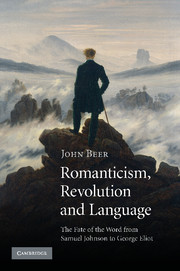Book contents
- Frontmatter
- Contents
- Preface and acknowledgments
- List of abbreviations
- 1 ‘Democracy’ in Somerset and beyond
- 2 Politics, sensibility and the quest for adequacy of language
- 3 The heart of Lyrical Ballads
- 4 The Prelude: a poem in process
- 5 Words or images? Blake's representation of history
- 6 Blake, Coleridge and ‘The Riddle of the World’
- 7 Challenges from the non-verbal and return to the Word
- 8 The Nature of Hazlitt's taste
- 9 Jane Austen's progress
- 10 Languages of memory and passion: Tennyson, Gaskell and the Brontës
- 11 George Eliot and the future of language
- Index
11 - George Eliot and the future of language
Published online by Cambridge University Press: 04 August 2010
- Frontmatter
- Contents
- Preface and acknowledgments
- List of abbreviations
- 1 ‘Democracy’ in Somerset and beyond
- 2 Politics, sensibility and the quest for adequacy of language
- 3 The heart of Lyrical Ballads
- 4 The Prelude: a poem in process
- 5 Words or images? Blake's representation of history
- 6 Blake, Coleridge and ‘The Riddle of the World’
- 7 Challenges from the non-verbal and return to the Word
- 8 The Nature of Hazlitt's taste
- 9 Jane Austen's progress
- 10 Languages of memory and passion: Tennyson, Gaskell and the Brontës
- 11 George Eliot and the future of language
- Index
Summary
At first sight there might seem to be something supremely wrong-headed in making George Eliot an exemplar of ‘the fate of the word’, given her status as a practitioner of verbal artistry who, in her own words, saw that language could be ‘the magic signs that conjure up a world’. She was increasingly aware, however, that if words were to exercise the fullness of that magic, something more than simple text was needed.
Once the circumstances in which she began her intellectual writings are recalled, moreover, it becomes clear that throughout her career the status of the word was always for her uncertain. By the time she reached intellectual maturity, the temper of English culture had changed even from that prevailing at the time of the major Romantic poets. The varying impetus given to literature by the French Revolution, the revulsion against the Terror in France and the rise and fall of Napoleon, followed subsequently by the meteoric careers of Keats, Shelley and Byron, had been succeeded by a period of reappraisal and reflection, during which intelligent writers considered the problems left by the passing of the Napoleonic Wars.
As far as the Bible was concerned, George Eliot's views were even more advanced than those of Elizabeth Gaskell. The Unitarians of the time might be heretical in terms of doctrine, but they retained a reverence for the Word as such.
- Type
- Chapter
- Information
- Romanticism, Revolution and LanguageThe Fate of the Word from Samuel Johnson to George Eliot, pp. 200 - 224Publisher: Cambridge University PressPrint publication year: 2009



